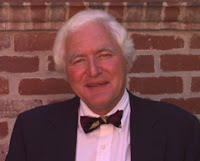 This essay
This essay in the Armed Forces Journal calls for Congressional intervention in the selection and promotion of general officers. (Under Clinton and previously, the generals selected each other; under this president the secretary of defense has selected all new three- and four-star generals).
The author, a lieutenant colonel, is calling for intellect and achievment to be recognized. The problem in my view is that regardless of the quality of the general officer, he would be hamstrung by that Civil War ethos that dominates all thinking in the services today (linearity, synchronization, occupation of space, firepower, hierarchy); he would be hampered by a diffusion of authority across hundreds of generals and commands; he would be bound to consult dozens of civilian masters, including under-secretaries of this and that; he would be trapped in a web of "Jointness" (real word) requiring enormous investment in cross-service communications and consensus building; he would be micromanaged by anyone able claiming a stake in his success; and he would never, ever be allowed to pursue strategy because strategy is the death of political ad hockery. Strategy sets goals, timetables, means, and ends under which politicians careers could be crushed.
Furthermore to say, as this author does, that we are at Valmy on the road to Jena, makes the classic error of confusing any commanding general in any situation with the commander-in-chief as head of state (Frederick, Napoleon).
I do want political generals, however, and I do heartily agree that:
If America desires creative intelligence and moral courage in its general officer corps, it must create a system that rewards these qualities. Congress can create such incentives by exercising its proper oversight function in three areas. First, Congress must change the system for selecting general officers. Second, oversight committees must apply increased scrutiny over generating the necessary means and pursuing appropriate ways for applying America's military power. Third, the Senate must hold accountable through its confirmation powers those officers who fail to achieve the aims of policy at an acceptable cost in blood and treasure.
The Civil War was led almost entirely by political generals, chief among them Scott (Seward's creature), McClellan (Chase's creation), Grant (Washburne's project), etc. These were civilians who had left the service and returned to it at an exalted rank; and there were also civilians who donned the stars with no experience, as in WWII. The exceptions are few: Meigs, FJ Porter, Franklin, Tim Sherman all had unbroken service up until Sumter but even these were promoted far beyond their experience as a result of political decisions based on political patronage.
The post-ACW professionalism wrought by Grant and Sherman had to be radically modified for the Spanish-American war, two world wars, and Korea. Its implementation by MacNamara under Kennedy and Johnson, leavened with his management philosophies, might reasonably be declared a failure at this time.
Frederick the Great admonished, "You officers amuse yourselves with God knows what buffooneries and never dream in the least of serious service..." We can say nowadays that ours amuse themselves with the accoutrements of professionalism: procurement, seminars, reports, management training, social experiments, programs, policy development, and briefings, briefings, briefings.
There was a
famous quote: "I'd rather entrust the government of the United States to the first 400 people listed in the Boston telephone directory than to the faculty of Harvard University." It has some applicability to this case of extreme professionalism, the number of Army generals on duty
being set at 302.
(More
of the same subject here.)
 John M. Parrish, thinker specializing in the "dirty hands" problem in politics. Mr. Parrish will put historical and philosophical context around what appear to be Lincoln's "dirty hands," 1861-1865.
John M. Parrish, thinker specializing in the "dirty hands" problem in politics. Mr. Parrish will put historical and philosophical context around what appear to be Lincoln's "dirty hands," 1861-1865. Michael F. Holt, 19th Century political historian and author of The Rise and Fall of the American Whig Party. Mr. Holt will draw comparisons between James Polk's Democratic Party building during the Mexican War and Lincoln's Civil War efforts on the same lines.
Michael F. Holt, 19th Century political historian and author of The Rise and Fall of the American Whig Party. Mr. Holt will draw comparisons between James Polk's Democratic Party building during the Mexican War and Lincoln's Civil War efforts on the same lines. Carolyn Stewart Dyer, journalism scholar and author of Political Patronage of the Wisconsin Press, 1849-1860, will discuss the crucial role of press patronage in Republican Party building and how it affected war coverage.
Carolyn Stewart Dyer, journalism scholar and author of Political Patronage of the Wisconsin Press, 1849-1860, will discuss the crucial role of press patronage in Republican Party building and how it affected war coverage. James M. Brennan, Chairman of the Illinois Executive Ethics Commission. Mr. Brennan arranges the annual Abraham Lincoln Ethics Award and will speak on the current limits of patronage in government.
James M. Brennan, Chairman of the Illinois Executive Ethics Commission. Mr. Brennan arranges the annual Abraham Lincoln Ethics Award and will speak on the current limits of patronage in government.





 Maybe this blog should have one. "
Maybe this blog should have one. " Indeed.
Indeed.






